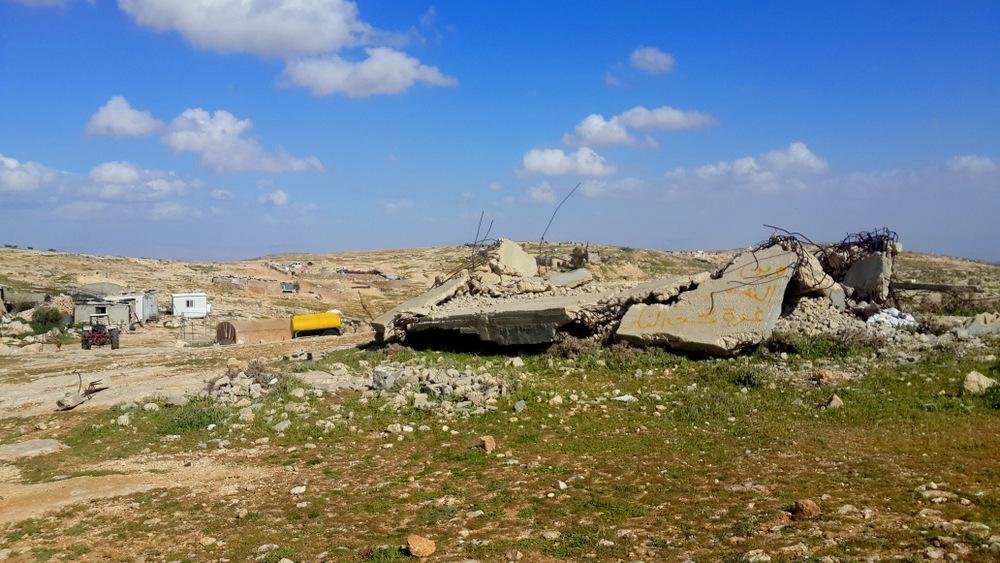Massafer Yatta - community under threat
The Israeli-Palestinian film “No Other Land” by Basel Adra and Yuval Abraham won the audience Award at this year’s Berlinale film festival. The filmmakers speech at the prize ceremony, in which they called for an end to Israeli apartheid, an end to German weapons exports to Israel, and a ceasefire in Gaza,were absurdly labeled ”antisemitic” by German and Israeli news outlets and caused the German cultural scene to stir a frenzy about “allowed speech.” Yuval Abraham even received death threats. But while the focus in the European debate now lies on what statements an Israeli journalist in Germany may make, the actual topic of the film that won the award – the plight of Massafer Yatta – is once again shunned to the side.
What is happening in Massafer Yatta?
Situated in the southern region of Al Khalil, Massafer Yatta is composed of twelve communities trapped within Area C, governed by Israeli military law. Since the 1980s, Israel has systematically encroached upon this land, designating it as "firing zones," a pretext for expulsion of Palestinian inhabitants from their ancestral lands. This encroachment has rendered the area increasingly volatile, with settlers launching violent attacks on livestock and vital resources, while the military, complicit through its inaction, turns a blind eye to these atrocities.
This Palestinian community’s stark reality of perpetual displacement and oppression unfolds daily. Denied the basic right to construct permanent structures since 1999, residents find themselves living in makeshift tents amidst looming threats of demolition orders arbitrarily issued by Israeli authorities. This struggle for stability and security has only intensified since October 7, 2023, with settlers brazenly donning army uniforms, emboldened by a culture of impunity. Bulldozers tear through homes, leaving devastation in their wake. The villagers are also subjected to physical violence by the settlers. Mohammed Hureini, a resident of Massafer Yatta and part of the movement Youth Of Sumud, recounts how his cousin was violently shot in the stomach by a settler with an outlawed type of ammunition, illustrating the serious dangers facing the community.
Massafer Yatta is not merely a localized issue but emblematic of a broader Israeli colonial enterprise. The presence of international media offers little respite, as evidenced by the assault on Basel Adra in May 2022, highlighting the systematic suppression of information. A journalist from Japan, too, fell victim to settler violence. His camera was stolen and he was forced to leave Massafer Yatta, tells Hureini. This underscores the efforts by Israelis to control the narratives emerging from Palestine. This environment of fear and censorship perpetuates a cycle of violence and oppression, leaving Massafer Yatta trapped.
In the face of such adversity, the resilience of the Palestinian community in Massafer Yatta shines through. Although some have been expelled under threat (4 villages destroyed between 7 October and 6 December 2023) and have suffered incessant attacks, they refuse to be silenced. Their struggle serves as a stark reminder of the ongoing human rights violations and the urgent need for intervention. As the world watches, the people of Massafer Yatta continue to fight for their right to live in dignity and peace on their ancestral land.
By Hafina, 2023 participant in FFIPP Summer Programme
Sources and further reading:
Palestinian villagers in Masafer Yatta face immediate expulsion, Al Jazeera, 4 January 2024
Speech by Basel Adra and Yuval Abraham at Berlinale
UN experts alarmed by Israel High Court ruling on Masafer Yatta and risk of imminent forcible transfer of Palestinians - OCHA report,16 May 2022
“I Only Clapped For The Israeli” Says German Minister - Novara Media report on the Berlinale speech and discourse in Germany
No Other Land Trailer
Everyday Evil in Palestine: The View from Lucifer’s Hill. Ilan Pappé, 2021. Published in Janus Unbound: Journal of Critical Studies.
Picture: Wikimedia Commons


